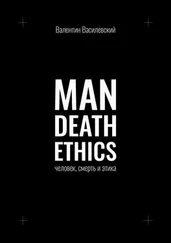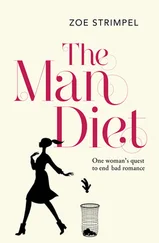Walentin Wasielewski - Man death ethics
Здесь есть возможность читать онлайн «Walentin Wasielewski - Man death ethics» — ознакомительный отрывок электронной книги совершенно бесплатно, а после прочтения отрывка купить полную версию. В некоторых случаях можно слушать аудио, скачать через торрент в формате fb2 и присутствует краткое содержание. ISBN: , Жанр: Прочая научная литература, Философия, Политика, на английском языке. Описание произведения, (предисловие) а так же отзывы посетителей доступны на портале библиотеки ЛибКат.
- Название:Man death ethics
- Автор:
- Жанр:
- Год:неизвестен
- ISBN:9785005615152
- Рейтинг книги:4 / 5. Голосов: 1
-
Избранное:Добавить в избранное
- Отзывы:
-
Ваша оценка:
- 80
- 1
- 2
- 3
- 4
- 5
Man death ethics: краткое содержание, описание и аннотация
Предлагаем к чтению аннотацию, описание, краткое содержание или предисловие (зависит от того, что написал сам автор книги «Man death ethics»). Если вы не нашли необходимую информацию о книге — напишите в комментариях, мы постараемся отыскать её.
Man death ethics — читать онлайн ознакомительный отрывок
Ниже представлен текст книги, разбитый по страницам. Система сохранения места последней прочитанной страницы, позволяет с удобством читать онлайн бесплатно книгу «Man death ethics», без необходимости каждый раз заново искать на чём Вы остановились. Поставьте закладку, и сможете в любой момент перейти на страницу, на которой закончили чтение.
Интервал:
Закладка:
Man death ethics
Walentin W. Wasielewski
Proofreader Lucas James Wiese
© Walentin W. Wasielewski, 2022
ISBN 978-5-0056-1515-2
Created with Ridero smart publishing system
prolegomena I
1. Good and evil are not entities, but parameters. The only moral fact is death, and morality is the attitude towards death: everything that leads the system to destruction is evil; everything that overcomes the death of the system is good. The open-question argument is removed without appeal to a naturalistic fallacy.
2. All problems are linked to death. What does not lead to death is not a problem. Any obstacle, barrier, difficulty, or limit is a problem for us only if we know how it can kill us.
3. To understand death as a problem, we need a system of tenses. Any understanding is the transfer of a real event as an abstract symbol from the past to the future, and then the perception of the abstract future in the real present. The only known system that can operate with time is the human language. Human is the only socio-cognitive system that has understood death as a problem .
4. Ethics is a method of development.
5. The purpose of development is to overcome the problem – to obtain freedom from the limitations of death. Beginning with situational problems: hunger, cold, diseases, and external threats; up to the absolute problem: death as such. Overcoming these problems breaks Hume’s guillotine not by logic, but by the phenomenon of will. Overcoming is a transition from a naturally existing limit is to prescribed by a free reason ought .
6. Survival and overcoming death are not the same thing. Survival is the avoidance of death, the selection of forms and behaviors that allow not to face the problem. Death for Natural Selection is a tool of development, and Death for overcoming is a subject of development.
7. Achieving the development goal is the transition of the system to a new qualitative state. A New World and a New Man, free from the problem of death, will have no need for morality and ethics.
prolegomena II
1. The act of understanding death gives birth to the essence of human being. Based on this definition, any social-cognitive system that understands death will be human, ranging from any species of living beings to an artificial intelligence.
2. Understanding is possible only in the system of tenses of the language. The system of tenses is the defining quality of human language, unlike all other information exchange systems, from natural RNA/DNA to animal communication systems. In fact, the abstract time machine of language is the mind.
3. Reason makes it possible to relate to death. Understanding and reasoning about what leads to death or what overcomes death provides a human an attitude towards death.
4. The attitude towards death is a dichotomy of good and evil. Thus, good and evil are not entities, but parameters of the relationship to death as a single entity.
5. Ethics is a method of development. Knowing the limit and its parameters, we get the opportunity to overcome the limit. Now, the capabilities of the available tools are never enough for a human. If it is known how the function can be performed better or worse in relation to death, then the development flywheel is launched towards a goal.
6. The goal of development is to overcome death. All problems come down to death. What does not lead to death is not a problem, does not require ethical evaluation, and does not require development and overcoming.
7. By achieving the development goal of the system, the system then transitions to a new quality. After overcoming death there will be no need for an attitude towards death – no need for morality or ethics and no need for development and overcoming. The New World will define new parameters, limits, and essences for the New Man – a Superman.
prolegomena III
1. Subject: the phenomenon of awareness of death . Hypothesis: awareness of death is a unique phenomenon in nature, which gave rise to a system of a new quality, human being . Only the awareness of death makes it possible an attitude to death.
2. The attitude to death forms morality as an experience of causes of death and ethics as a method of overcoming death. The ethical method gives humanity a unique ability to overcome problems, causes of death. Thus ethics is a method of development based on a hypothesis of freedom.
3. The wild nature has no awareness of death, no attitude to death and no method of development. Therefore, nature develops through natural selection of random errors. So death is a tool for the development of nature. It is impossible to overcome death as a problem by death as a tool .
4. Humanity is a socio-cognitive phenomenon, a system that has understood the problem of death . So we break the binding of a concept of human to the animal species Homo Sapiens . Any socio-cognitive system that understands the problem of death can be called a human being.
5. The understanding is a system of abstract symbols in the system of tenses. The understanding of any phenomenon necessarily implies the movement of an abstract model of this phenomenon in abstract time relative to reality. Therefore, mathematics without a system of tenses of its abstract symbols is not a full-fledged language.
6. Development is a transition from one quality of developing phenomenon to another, by overcoming the limits of phenomenon.
7. The idea of development for a human being is overcoming the problem of death. Beyond that limit will no longer be a human, but a Superman, or New Man. The values, ideas and problems of the New World will be qualitatively different.
Aristotle’s Mistake
To be, or not to be, Ay there’s the point…
– William Shakespeare, Bad Quarto
Considering Aristotle’s work Nicomachean Ethics, I would like to draw attention to a key point that characterizes the generally accepted and erroneous approach in all studies of the question of good and evil to the present day.
Aristotle looks at the good as an entity: «… every action and pursuit, is thought to aim at some good; and for this reason the good has rightly been declared to be that at which all things aim.» As if good is something that can be defined; a phenomenon that can be arrived at; as if it were some kind of independent entity. But this is not the case.
This position is an error that reduces all ethical reasoning from Aristotle to George Edward Moore to invariably contradictory results. Reasoning exclusively about the good implies simplification: as if evil is something opposite to good, a kind of good with a minus sign , as antigood . But evil is not equal to good with a minus sign , as well as evil with a minus sign is not equal to good:
EVIL≠ – GOODor GOOD≠ – EVIL
I claim that good as the entity, that served as the starting point in Aristotle’s reasoning, was chosen incorrectly. It is wrong to talk about good outside of its constant connection with evil, endowing them with the properties of certain entities independent of each other. We should not forget that good and evil, benefit and harm, virtue and vice are a dichotomy. So, when it comes to such a phenomenon as dichotomy, the representation of subclasses as independent entities entails the loss of the general meaning of the dichotomizing system, the dichotomizing entity. The loss of the meaning of the system of good and evil occurs the moment we replace one true entity with one of its subclasses, while endowing the subclass with a complete essential, or complete object character. By doing that, we take ourselves away from the true subject on the research of ethics. If we do not have the true essence of a subject, then we are liable to talk about anything except the truth. It is sad that philosophers, following Aristotle, persistently repeat this mistake even when the dichotomy of moral categories is known to everyone.
Читать дальшеИнтервал:
Закладка:
Похожие книги на «Man death ethics»
Представляем Вашему вниманию похожие книги на «Man death ethics» списком для выбора. Мы отобрали схожую по названию и смыслу литературу в надежде предоставить читателям больше вариантов отыскать новые, интересные, ещё непрочитанные произведения.
Обсуждение, отзывы о книге «Man death ethics» и просто собственные мнения читателей. Оставьте ваши комментарии, напишите, что Вы думаете о произведении, его смысле или главных героях. Укажите что конкретно понравилось, а что нет, и почему Вы так считаете.
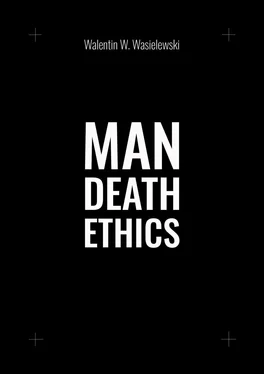
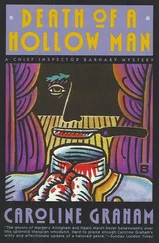



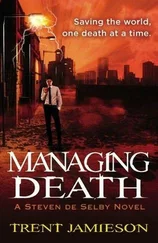
![Микки Спиллейн - Death of the Too-Cute Prostitute [= Man Alone]](/books/437201/mikki-spillejn-death-of-the-too-thumb.webp)
